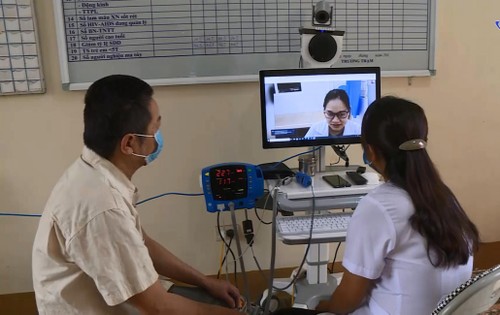 Diagnosis and initial treatment for a patient with hypertension are conducted through a remote medical examination and treatment system. (Photo: thainguyentv.vn) Diagnosis and initial treatment for a patient with hypertension are conducted through a remote medical examination and treatment system. (Photo: thainguyentv.vn) |
With an image storage and transmission system, doctors at provincial and grassroots-level hospital can make a quick, on-the-spot diagnosis for patients in life-threatening conditions like stroke.
The app has been deployed by Vinh Long provincial General Hospital since 2021, helping doctors diagnose remotely and view CT scan images with smartphones, thus promptly saving many stroke patients during the critical hour and improving the treatment quality.
Doctor Bui Thi Yen Chi in charge of the stroke section of Vinh Long provincial General Hospital said the Bass app is an optimal system for patients’ CT scan image management, allowing doctors to directly use images online.
“With a smart phone having an Internet connection, the doctors, wherever they are, can see the scan images in 1-2 minutes and then read the results to their colleagues. Thus, it’s possible to meet the critical time to save the patients,” Chi noted.
The stroke section is one of many faculties in Vinh Long provincial General Hospital where IT is widely applied. Online connection systems have helped establish remote coordination between specialties, thus giving timely treatment to many serious cases.
In addition, the process has shortened examination time when doctors can preview the ultrasound and test results on computer without waiting for the patients to take the results back to the consulting-rooms.
According to Doctor Nguyen Thanh Truyen, Director of Vinh Long provincial General Hospital, remote examination and treatment registration has been applied to reduce waiting time and make it easy for patients during the medical checkup process.
“We are also implementing non-cash payment when collecting hospital fees and piloting electronic medical records in a number of departments. The electronic medical record management system will gradually be applied across the hospital,” Truyen added.
Many medical facilities in the South have put into operation the inter-hospital medical checkup registration app which allows users to select the hospital they want.
In the North, digital medical examination and treatment has become more popular in Lao Cai and Thai Nguyen provinces, for example.
In the first half of this year, the rate of people registering for medical examination and treatment at Lao Cai provincial General Hospital with chip-based ID cards reached 64%. The rate of non-cash payment has gradually increased.
Lao Cai city’s General Hospital has also used electronic medical records and acted as a bridge for online videoconferences, test management software, and medical image management.
Thanks to the vnCARE app, a people's health care solution, the hospital's doctors know the time for the patients’ follow-up examination, even can call to remind them, and schedule the time for each specific case.
Pham Thi Thu, Head of the Administration, Finance and Accounting Section of the Hospital, said, “More than 100 patients register online for examination and appointment each day on average. vnCARE software is very useful.”
All medical facilities in Thai Nguyen province have provided health-insurance-based examination and treatment using chip-based ID cards.
They have synchronized medical records of over 1.1 million patients. Nearly 380,000 people have electronic health records, equivalent to 29% of the province’s population.
 Dang Ngoc Huy, Director of the Thai Nguyen Department of Health (Photo: thainguyentv.vn) Dang Ngoc Huy, Director of the Thai Nguyen Department of Health (Photo: thainguyentv.vn) |
Dang Ngoc Huy, Director of the Thai Nguyen Department of Health, said the results are the foundation to build a digital health industry.
“To further speed up digital transformation this year and in the following years, we will upgrade the IT infrastructure from grassroots to provincial level to well-managed medical examination and treatment, continue designing software to support digital management, and build health IT infrastructure to help better management,” said Huy.
With an extensive IT system from the grassroots medical level and gradual improvement in infrastructure and human resources, Vietnam’s health sector is making strides on the digital transformation roadmap and changing examination and treatment quality.